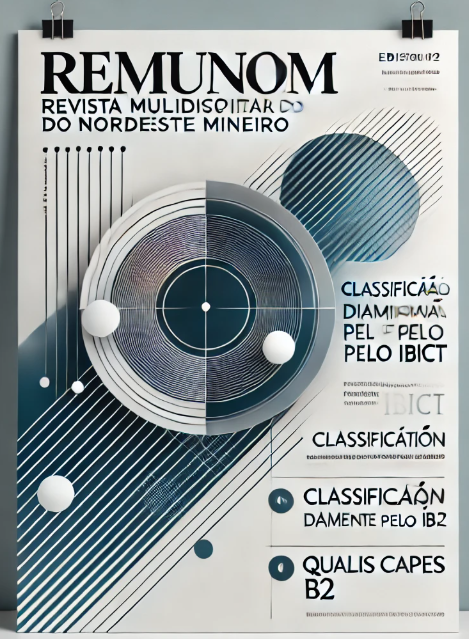DESEMPENHO ZOOTÉCNICO DE LEITÕES ALIMENTADOS COM FARINHA DE RESÍDUO DO PROCESSAMENTO AGROINDUSTRIAL DE Psdium guajava L
DOI:
https://doi.org/10.61164/rmnm.v8i1.3889Keywords:
Goiaba, Promotores de desempenho, Alimentos alternativosAbstract
The guava (Psidium guajava L.) is a tropical fruit tree that is resistant and productive, and its processing residue (seeds and residual pulp) is rich in nutrients and has potential to be used as an ingredient in animal feed rations. Eleven treatments were outlined using a response surface methodology, using two variables, guava flour (GF) and amoxicillin. Three animals were used per experimental unit, totaling 33 piglets with an initial age of 28 days. A variation in performance (ADG, GPD, and CA) was observed among the different treatments, decreasing both GF and antibiotic. The non-significance of the data for GPD may be due to the variability of the samples, including individual differences between animals and uncontrolled factors. The addition of high levels of GF may have affected the palatability and digestibility of the ration, leading to a reduction in feed intake by the piglets. The best feed conversion was observed with moderate levels of GF inclusion and antibiotic. The relationship between guava flour (GF) and antibiotics depends on the concentration and proportion of each component, influenced by the diet and health of the animals, and can have beneficial or antagonistic effects. Guava flour is a promising option for promoting intestinal health and improving swine performance, as long as it is properly incorporated into diets and considering factors such as concentration, source, and individual characteristics of the animals.
References
ALI, Q.; MA, S.; LA, S.; GUO, Z.; LIU, B.; GAO, Z.; FAROOQ, U.; WANG, Z.; ZHU, X.; CUI, Y. Microbial Short-Chain Fatty Acids: A Bridge between Dietary Fibers and Poultry Gut Health. A Review. Anim. Biosci. v.35, p.1461–1478. 2022
CÂNDIDO, T. R. S.; MENDONÇA, R. S.; LINS, U. M. D. B. L.; DE SOUZA, A. F.; RODRIGUEZ, D. M.; DE CAMPOS-TAKAKI, G. M.; DA SILVA ANDRADE, R. F. Production of biosurfactants by Mucoralean fungi isolated from Caatinga bioma soilusing industrial waste as renewable substrates.Research, Society and Development, v.11, n.2, e13411225332-e13411225332, 2022.
CRUZ, H.; MEDEIROS, A. Potencialidade das folhas da goiabeira em formulações cosméticas. Enciclopedia biosfera, v.20, n.43, p.156-171, 2023.
FALCONER, D. S.; MACKAY, T. F. C. Introduction to quantitative genetics. Longman. 4.ed, Addison Wesley Longman, Harlow.1996.
GRESSE, R.; DUNIERE, L.; CHAUCHEYRAS-DURAND, F.; BLANQUET-DIOT, S. Microbiota composition and functional profiling throughout the gastrointestinal tract of commercial weaning piglets. Microorganisms, Basel, v.7, n.9, p.343, 2019.
HUANG, Q.; LIU, X.; ZHAO, G.; HU, T.; WANG, Y. Potential and challenges of tannins as an alternative to in-feed antibiotics for farm animal production. Anim. Nutr. v.4, p.137–150, 2018.
IBM SPSS Statistics 21. IBM. 2012. Software. Disponível em: <http://www01.ibm.com/software/analytics/spss/products/statistics/>
NASSARAWA, S. S.; NAYIK, G. A.; GUPTA, S. D.; ARECHE, F. O.; JAGDALE, Y. D.; ANSARI, M. J.; HEMEG, H. A.; AL-FARGA, A.; ALOTAIBI, S. S. Aspectos químicos das interações polifenol-proteína e sua atividade antibacteriana. Crítico. Rev. Nutr., v.27, p.1–24, 2022.
OLCHOWIK-GRABAREK, E. G.; SĘKOWSKI, S.; KWIATEK, A.; PŁACZKIEWICZ, J.; ABDULLADJANOVA, N.; SHLYONSKY, V.; SWIECICKA, I.; ZAMARAEVA, M. The structural changes in the membranes of Staphylococcus aureus caused by hydrolysable tannins witness their antibacterial activity. Membranes, v.12, p.1124. 2022.
PANDEY, A.; NAYAK, S.; KHARE, A.; SHARMA, R.; CHOURASIYA, A.; REDDY, B. V. V.; DANIEL, RISHEEN G.; Perspectives in the use of tannins in animal production & health: a review. J. Livestock Sci. v.13, p.112-119, 2022.
RIBEIRO, B. B. Aspectos comerciais da cultura da goiaba no Brasil. Trabalho de Conclusão de Curso (Bacharelado em Agronomia) — Universidade de Brasília, Brasília - DF, 2021.
STEEL, R. G. D.; TORRIE, J. H. Principles and procedures of statistics: A biometrical approach. Nova York: McGraw-Hill, 1980.
TEIXEIRA, L.; MACHADO, G. S.; VILELLA, L. M.; SCHROEDER, B.; KESLER, A. M.; TREVIZAN, L.; PINTO, C. F. D. Efeito da substituição parcial de milho por sorgo e taninos hidrolisáveis em dietas para cães adultos. In: XVII Congresso Brasileiro de Nutrição Animal Pet, Anais... Campinas. XVII CBNA Pet, 2018.
XU, Z.; DU, Y.; LI, N.; GENG, H.; ALI, Q.; LI, X.; GAO, Y.; WANG, Y.; XING, R.; WU, J. Effects of Alfalfa Meal on Quality and Function of Pork Meatballs. Food Sci. Nutr. v.10, p.2601–2610, 2022.
Downloads
Published
How to Cite
Issue
Section
License
Copyright (c) 2025 Revista Multidisciplinar do Nordeste Mineiro

This work is licensed under a Creative Commons Attribution-NonCommercial-ShareAlike 4.0 International License.




